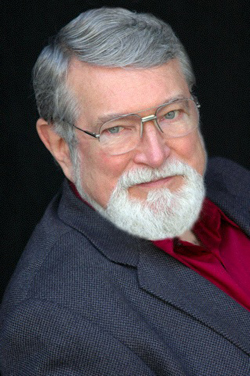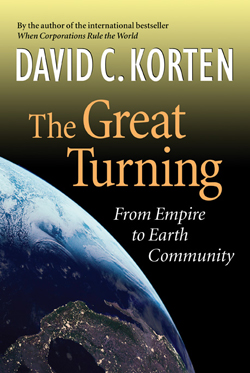Green Profits Can Still Impoverish the Earth
Air Date: Week of April 18, 2008

Author David Korten says the human instinct toward cooperation, not competition, will solve the world’s environmental problems. (Courtesy of David Korten)
David Korten, author of “The Great Turning: From Empire to Earth Community” and host Steve Curwood continue Living on Earth’s Earth Day discussion on the greening of corporations. Korten says green consumption won’t solve the larger problems at the root of environmental degradation.
Transcript
CURWOOD: David Korten is far more skeptical about the willingness of business to address the profound challenges of environmental change. Mr. Korten is an author and social researcher whose books include When Corporations Rule the World, as well as his latest volume, Great Turning: From Empire to Earth Community. He says solving the world’s environmental problems will require much more than the current trend of corporations painting themselves a glossy shade of green.
KORTEN: Well I think it certainly reflects a change in the public consciousness, and awareness on the part of corporations that they had better appear green or they’re gonna lose a lot of consumer loyalty. The unfortunate reality, however, is that the institution itself is legally structured in a way that it is very difficult for it to make any choices that do not increase its profits.

David Korten’s book describes the structural changes he believes are needed to improve environmental degradation and economic inequality. (Courtesy of David Korten)
KORTEN: Well, basically, you know, if you can give the big corporations enough subsidies so it’s worth their while to move ahead with environmental technologies, uh, they will respond. But that is gonna be, normally, at an enormous cost to taxpayers. And the thing that’s often not mentioned is if you’re increasing the profits of corporations, you’re basically serving the interests of the wealthiest investors over the working people who actually produce goods and services.
CURWOOD: In these recent years we’ve seen a green version of virtually every product coming out on the market, whether it’s a car that gets better mileage or a cleaner that’s less toxic, or a home that has a lower carbon footprint. To what extent can we consume our way to conservation?
KORTEN: If we substitute a green product for a toxic, or energy inefficient product, that is – that’s an advantage. But all of this misses the point of the extraordinary seriousness of our global-scale problem, and the larger fact that we are consuming Earth’s resources at a much more rapid rate than what can be regenerated. One of the things we have to do is get beyond this myth that as the economy grows, we bring the bottom up, and so, we don’t need to worry about the people on the top; we will all increase our consumption. And that’s, that’s a major blind spot in economics – the idea that on a finite planet, you can have infinite growth.
CURWOOD: So to what extent are you optimistic about the future then?
KORTEN: Well, I sometimes, (sigh) frankly, Steve, get very scared, because the rate at which our environmental systems are collapsing is terrifying. Ironically, one of our best hopes may be the fact that we are moving rapidly into a serious collapse of the financial system. This is not a normal business cycle, because we are also running up against very real limits. We’ve got more and more people competing for this diminished resource base, in everything from oil to fresh water.

Author David Korten says the human instinct toward cooperation, not competition, will solve the world’s environmental problems. (Courtesy of David Korten)
And this is not going to be a normal recovery. Now, as harsh and as difficult as a financial collapse will be, it could in some ways be considered a blessing because it forces us to step back and ask some of these deeper questions about what we want, and to consider reforms that previously were off the table – very much like what happened with the Great Depression of the 1930’s.
CURWOOD: Where do you get the political will to make such deep, structural changes in society? Redistributing wealth has been a holy grail of social progressives for a long time, and it seems that we’re if anything, going in the opposite direction.
KORTEN: We’re definitely moving in the opposite direction. Now, you know, I think this environmental crisis creates an extraordinary moment of opportunity. It’s often presented that the changes we need to make will involve serious sacrifice.
But one of the things I learned in all my experience living around the world and in working with global citizen movements, is that for all the diversity of the world’s cultures and peoples, when you get right down to it most of the world’s people want a world in which our children are healthy and happy, in which we have strong families, in which we have strong communities, caring communities, and a healthy natural environment. Once we begin moving beyond meeting basic human needs, real happiness depends on the strength of our communities and families. So it’s actually – we face a combination of the imperative to change as a price of our very survival as a species, combined with the opportunity to create the world that most of us actually dream about, that we’re told is beyond our reach.
We’re so locked into stories that are very partial or even false – including the idea that life is fundamentally competitive and that progress comes through competition – if one steps back and takes a deeper look at living systems, as some of the people at the forefront of the new biology are doing, you begin to recognize that at a deeper level, life is a fundamentally cooperative project.
CURWOOD: David Korten’s latest book is called Great Turning: From Empire to Earth Community. Thank you so much for taking this time.
KORTEN: It’s been a great pleasure, Steve.
Links
To hear a longer version of Steve Curwood’s conversation with David Korten, click here
Living on Earth wants to hear from you!
Living on Earth
62 Calef Highway, Suite 212
Lee, NH 03861
Telephone: 617-287-4121
E-mail: comments@loe.org
Newsletter [Click here]
Donate to Living on Earth!
Living on Earth is an independent media program and relies entirely on contributions from listeners and institutions supporting public service. Please donate now to preserve an independent environmental voice.
NewsletterLiving on Earth offers a weekly delivery of the show's rundown to your mailbox. Sign up for our newsletter today!
 Sailors For The Sea: Be the change you want to sea.
Sailors For The Sea: Be the change you want to sea.
 The Grantham Foundation for the Protection of the Environment: Committed to protecting and improving the health of the global environment.
The Grantham Foundation for the Protection of the Environment: Committed to protecting and improving the health of the global environment.
 Contribute to Living on Earth and receive, as our gift to you, an archival print of one of Mark Seth Lender's extraordinary wildlife photographs. Follow the link to see Mark's current collection of photographs.
Contribute to Living on Earth and receive, as our gift to you, an archival print of one of Mark Seth Lender's extraordinary wildlife photographs. Follow the link to see Mark's current collection of photographs.
 Buy a signed copy of Mark Seth Lender's book Smeagull the Seagull & support Living on Earth
Buy a signed copy of Mark Seth Lender's book Smeagull the Seagull & support Living on Earth

